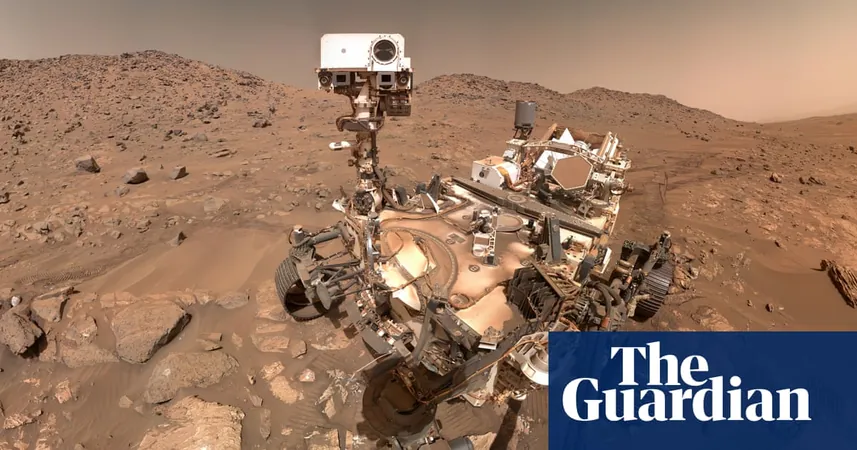
Uncertainty Looms Over NASA's SLS Rocket as Outsourcing Gains Traction Under Trump's Agenda
2024-12-03
Author: William
As speculation swirls around the future of NASA's Space Launch System (SLS) rocket, the prospect of increased outsourcing to private companies is gaining momentum, particularly in light of Donald Trump’s recent electoral victory. This potential shift raises critical questions regarding the timeline and objectives of NASA's ambitious Artemis programme, which aims to return humans to the Moon for the first time since 1972.
The Artemis III Mission
The Artemis III mission is pivotal, involving a launch aboard NASA's Orion capsule, powered by the SLS. Upon reaching lunar orbit, the Orion is set to rendezvous with SpaceX's Starship—a vehicle owned by Elon Musk—before two astronauts descend to the lunar surface in Starship. Following their exploration, they'll return to Orion to make the journey back to Earth, leaving Starship in lunar orbit. This collaborative effort highlights the growing reliance on private industry for space exploration.
Voices of Caution
However, there are voices of caution regarding the SLS's future. Notably, space journalist Eric Berger remarked on social media platform X that “it seems at least 50-50 that NASA's Space Launch System rocket will be cancelled.” While this is not an official confirmation, it echoes previous indications that the Trump administration may prioritize outsourcing NASA’s operations.
Impact on the Space Race
The discussion about SLS replacement is not merely administrative—it directly impacts the United States’ position in the current space race, especially with China aiming to land astronauts on the Moon by 2030. As China adheres closely to its ambitious timeline, US programs are reportedly hamstrung by various delays, including design issues with spacesuits and complications in the Orion system.
Concerns About SpaceX’s Starship
Additionally, while SpaceX’s Starship holds promising capabilities, including reusability, it still needs to demonstrate critical functions such as in-space refueling and landing on the Moon. Industry experts warn that if China were to succeed in reaching the Moon before the US, it could irreparably affect America's space aspirations.
Elon Musk's Focus on Mars Missions
Musk's focus on Mars missions, targeting human exploration by 2028, has also raised eyebrows among some experts, who question the feasibility of achieving such goals. Initially championed during Trump's first term in 2017, the Artemis programme envisaged a permanent lunar research base but has since faced numerous setbacks, with the first landing now delayed until at least Autumn 2026.
Economic Feasibility of Cancellation
Despite the SLS’s successful launch during Artemis I in 2022, with costs exceeding US$2 billion (approximately £1.6 billion) per launch, fixing the delays picked up in the Artemis timeline remains a priority. Alternative launch options, such as the Falcon Heavy rocket, are on the table for consideration; however, modifications necessary for Orion's compatibility could lead to further complications.
The Decision-Making Process
With substantial investments already made in the SLS, total cancellation could prove economically unfeasible. Instead, a balanced approach could involve enhanced commercial partnerships while maintaining critical existing infrastructure. The new administration's inclination to scrutinize federal expenditures is to be expected, yet any decision will carry significant implications for NASA’s future missions.
Conclusion
Ultimately, the stakes of this evolving narrative are high. The decision-making process will need to justify its outcomes not only to lawmakers and taxpayers but also to a public eager to see the US maintain its competitive edge in the arena of space exploration.
Stay tuned for further updates as the story unfolds!









 Brasil (PT)
Brasil (PT)
 Canada (EN)
Canada (EN)
 Chile (ES)
Chile (ES)
 España (ES)
España (ES)
 France (FR)
France (FR)
 Hong Kong (EN)
Hong Kong (EN)
 Italia (IT)
Italia (IT)
 日本 (JA)
日本 (JA)
 Magyarország (HU)
Magyarország (HU)
 Norge (NO)
Norge (NO)
 Polska (PL)
Polska (PL)
 Schweiz (DE)
Schweiz (DE)
 Singapore (EN)
Singapore (EN)
 Sverige (SV)
Sverige (SV)
 Suomi (FI)
Suomi (FI)
 Türkiye (TR)
Türkiye (TR)